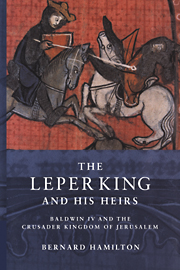Book contents
- Frontmatter
- Dedication
- Contents
- List of illustrations
- Acknowledgements
- List of abbreviations
- Maps
- Genealogies
- Glossary
- Prologue
- 1 The sources for Baldwin IV's reign
- 2 Baldwin's childhood
- 3 The kingdom
- 4 The international status of the kingdom
- 5 The king's minority
- 6 Western aid. William of Montferrat and Philip of Flanders
- 7 The victor of Mont Gisard
- 8 Prince Reynald's initiative
- 9 The dying king
- 10 The heirs of the leper king
- Epilogue
- Appendix An evaluation of the leprosy of King Baldwin IV of Jerusalem in the context of the medieval world
- Bibliography
- Index
1 - The sources for Baldwin IV's reign
Published online by Cambridge University Press: 05 February 2015
- Frontmatter
- Dedication
- Contents
- List of illustrations
- Acknowledgements
- List of abbreviations
- Maps
- Genealogies
- Glossary
- Prologue
- 1 The sources for Baldwin IV's reign
- 2 Baldwin's childhood
- 3 The kingdom
- 4 The international status of the kingdom
- 5 The king's minority
- 6 Western aid. William of Montferrat and Philip of Flanders
- 7 The victor of Mont Gisard
- 8 Prince Reynald's initiative
- 9 The dying king
- 10 The heirs of the leper king
- Epilogue
- Appendix An evaluation of the leprosy of King Baldwin IV of Jerusalem in the context of the medieval world
- Bibliography
- Index
Summary
LATIN AND OLD FRENCH SOURCES
Narrative accounts
Two independent accounts of Baldwin IV's reign were written in the Latin East, William of Tyre's Chronicle and the Chronicle attributed to Ernoul. William was born in Jerusalem in c.1130, but as a young man went to western Europe where he was trained in the schools of France and Lombardy. After he returned to the Latin East in 1165 King Amalric commissioned him to write a history of the Crusader Kingdom. This is divided into twenty-three books and covers the period from the origins of the First Crusade to the year 1184. Book XXIII is incomplete, consisting only of a separate preface and a single chapter. Although the precise date of William's death is disputed, it occurred before 21 October 1186. William is justly considered one of the finest historians of the central Middle Ages and was uniquely well placed to be knowledgeable about public affairs in Baldwin IV's reign. King Amalric had appointed him tutor to Prince Baldwin in 1170, and then in 1175, during Baldwin IV's minority and while Raymond of Tripoli was regent, William was appointed archbishop of Tyre (a position second only to that of patriarch of Jerusalem in the Catholic hierarchy), and chancellor of the kingdom, which meant that he had charge of the royal archive and writing office. But scholars have been reluctant to accept that because William was an important political figure he was unlikely to have been impartial in his reporting of events, for although his work as chancellor gave him an excellent opportunity to be well informed about matters of state, he was also constrained, as any political figure is, by the need to be discreet. He is too good an historian to falsify evidence, but he is guilty on occasion of suppressing the truth. Sometimes he appears to have done this for reasons of political necessity. His account of Philip of Flanders's negotiations with the crown in 1177, for example, is so guarded that it is difficult to make out what really happened, although it is clear from hints that William gives that he knew much more than he wrote.
- Type
- Chapter
- Information
- The Leper King and his HeirsBaldwin IV and the Crusader Kingdom of Jerusalem, pp. 6 - 22Publisher: Cambridge University PressPrint publication year: 2000
- 1
- Cited by



